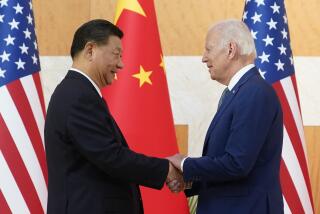Dim Prospects for China Premier’s Trip
- Share via
It seemed like a terrific idea at the time. Not long after President Clinton’s successful state visit to China last summer, Washington and Beijing agreed that Chinese Premier Zhu Rongji would come to America. Following Chinese President Jiang Zemin’s state visit to the U.S. in the fall of 1997, Zhu, the architect of China’s economic recovery policy, would be the second major leader of the People’s Republic of China to visit America in just two years. Given the diplomatic aridity that followed the 1989 Tiananmen disaster, Zhu’s arrival would put Sino-U.S. relations on an increasingly upbeat track.
Things haven’t quite worked out that way. The question now is whether this trip, at this particular time, is a good thing at all, and even whether it should be postponed.
If and when Zhu arrives next week in Los Angeles at the start of a nine-day stay, he will find a cranky U.S. Congress all but on the warpath over Chinese human-rights violations and spying allegations, a suspicious American press gradually but inexorably souring on President Clinton’s China engagement policy, and a U.S. president almost wholly and understandably preoccupied with the nightmare of Kosovo. The latter crisis alone makes the timing of this trip particularly awkward. Just the other day, Zhu’s boss, Jiang, called on NATO to halt the air strikes, excoriating America’s involvement as part of its “drive for hegemony” around the world.
No wonder the speculation from Beijing is that Zhu will sharply limit his exchanges with the media here. Perhaps that makes some sense. Between Beijing’s crackdown on democracy advocates and its opposition to NATO action regarding Kosovo, it’s hard to see how the trip will prove the media bonanza that Beijing desires. Or help soften public opinion here for the notion of China’s admission into the World Trade Organization on terms less tough than previously advertised by Washington.
Until recently, at least, U.S. administration officials had preferred that Zhu maximize his exposure to the news media rather than appear to shrink from it. Washington rightly believes that China is changing more rapidly than U.S. critics give it credit for. An openly reflective, accessible, even bantering Zhu would give the lie to the image of a grim Stalinist Beijing, locking up its critics.
Clinton administration officials have no doubt that Zhu could pull this off. Like Asian officials who have dealt with Zhu, U.S. leaders are uniformly impressed with his intellect and self- deprecating wit. They regard Zhu as one of the best, if not the very best, of the Chinese bosses to come down the pike in a very long time. And they give him credit for trying hard to reform China’s economy while avoiding a devaluation of the Chinese currency, a move that would plunge Asia into further turmoil.
Leading Chinese intellectuals agree with Washington about the need for Zhu to be open while he is here. They are keenly aware that Jiang has not registered that well with U.S. public opinion, as reinforced by a survey released just this month by the Chicago Council on Foreign Relations. Americans, it seems, think increasingly well of China, the country, but negatively about Jiang, the symbol of China’s leadership. Jiang himself may have very mixed feelings about Zhu having a field day with the American media.
Much is at stake. The same Chicago survey shows that, on a larger scale, the U.S. public is assessing anew the relative importance of Europe and traditionally undervalued Asia. In the last five years, this two-continent differential has narrowed in the mind of the American people. Even China’s overall image in the U.S. has been improving.
This trip may not help that. Zhu, preoccupied over the past several months with China’s many internal problems, from floods to reforms, has not prepared himself as intensively for this trip as China’s leading America-watchers would have preferred. His inner circle worries that too much press contact may expose the former Shanghai mayor to the risk of Beijing-blunder-itis, despite his unquestioned intellect and savvy. A disastrous Zhu visit would undermine the U.S. administration’s policy of engagement, a centerpiece of Clinton’s policy.
For all these reasons, his visit, once thought the culmination of a huge Sino-U.S. warming trend, is fraught with risk. But it’s almost certainly too late to call it off because of the massive preparations that such visits entail, even at a time when Clinton’s entire foreign policy seems in a free fall. Relations with Russia are in the tank; relations with Japan are workmanlike at best. Then there’s that dangerous, ambiguous mission in Kosovo. Clinton could use the uplift of a warming Zhu visit. Instead, the potential for diplomatic fiasco is everywhere.
More to Read
Sign up for Essential California
The most important California stories and recommendations in your inbox every morning.
You may occasionally receive promotional content from the Los Angeles Times.










